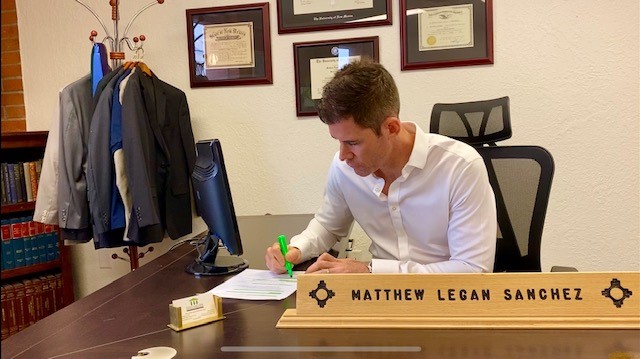
CIVIL RESTRAINING ORDERS IN ALBUQUERQUE, NEW MEXICO
I commonly field questions surrounding Civil Restraining Orders and Domestic Order of Protections. Often people use the two terms interchangeably, although the requirements, repercussions and overall process for requesting the two are inherently different.
CIVIL RESTRAINING ORDER VS. ORDER OF PROTECTION IN NEW MEXICO
Civil Restraining Orders and Domestic Order of Protections are Court Orders that prevent an alleged abuser from communicating, contacting, threatening, harming, harassing, annoying, or coming a certain number of yards from a protected party. The key difference between a Civil Restraining Order and an Order of Protection is that an Order of Protection falls under the Family Violence Protection Act, N. M. S. A. 1978, § 40-13-2. This means that the individual requesting the Order of Protection must demonstrate that a “household member” caused the alleged domestic abuse.
The term “household member” is pretty broad and includes:
- Spouse/former spouse,
- Boyfriend/girlfriend/lover,
- Co-parents/family members (over 18 years old)
- Continuing personal relationships.
Under the Family Violence Protection Act, it is not required for the parties to live with one another to be considered household members.
Another key difference is that an Order of Protection prevents the restrained party from possessing firearms or ammunition while the Order of Protection remains in place. According to federal law it is illegal to possess a firearm while you are subject to a restraining order that meets the following conditions: (1) The Order was issued after you had notice, and an opportunity to be heard; (2) The Order restrains you from harassing, stalking, or threatening an intimate partner; and (3) The Order includes a Judge (or Hearing Officer’s) finding that you are a threat to the safety of an intimate partner, or you are prohibited from the use of force against an intimate partner. See 18 U.S.C. § 922(g)(8). In other words, under federal law, you cannot possess or own a gun if you are currently subject to a Domestic Order of Protection that meets the requirements listed above.
Because Civil Restraining Orders do not involve household members or intimate partners, they ultimately do not prevent one from possessing firearms or ammunition while they are in effect.
To learn more about Order of Protections in New Mexico, click here: Domestic Order of Protections.
In New Mexico Order of Protections protect household members. Civil Restraining Orders are intended for individuals that have suffered or threatened with serious harm (i.e. immediate and irreparable injury) by a person such as a neighbor, co-worker or friend that does not fall under the definition of household member, as described above.
HOW TO APPLY FOR A CIVIL RESTRAINING ORDER IN ALBUQUERQUE
The process for obtaining a Civil Restraining Order can also be more time-consuming, tedious and expensive, relative to a Domestic Order of Protection. Click here to read the specific steps one must take to apply for a Civil Restraining Order in Bernalillo County: Applying for a Civil Restraining Order.
As illustrated above, the Verified Application for Restraining Order must be properly completed and filed, and served.
Once the Petition is completed and properly filed, the assigned Judge reviews the Petition and determines whether it “clearly appears from the specific facts shown in the Petition that immediate and irreparable injury, loss or damage will result to the Petitioner before the adverse party can be heard.”
At this stage the Judge leans on the side of caution and basically rubber stamps the Petition – granting a Temporary Restraining Order that expires in 10 days – and setting a Hearing within 10 days where the Respondent has the opportunity to fight the Petition by arguing that the claimed act of abuse never occurred. The Temporary Restraining Order ultimately expires on the date of the Hearing.
Appearing in Court for a Civil Restraining Order in Albuquerque
On the day of the Hearing, the Judge asks the parties’ to present their case and any evidence supporting their side. The burden of proof rests with the Petitioner to demonstrate that an act of abuse has occurred and that good cause exists to enter a Permanent Restraining Order. This essentially means that the Petitioner must demonstrate – by clear evidence – that the claimed act of abuse happened and that they will suffer immediate, irreparable injury if the injunction is not granted. It’s also important to note that Civil Judges tend to be considerably more formal with courtroom procedure, rules of evidence and decorum relative to the Domestic Violence Hearing Officers and/or Special Commissioners that preside over Domestic Order of Protection Hearings.
At the end of the Hearing the Judge will either Dismiss the Petition, refer the parties to mediation through the City of Albuquerque’s Mediation Program, or enter an Order on Application for Permanent Restraining Order extending the Temporary Restraining Order for a period of six months and up to one year.
(505) SANCHEZ IS HERE TO ANSWER ALL OF YOUR QUESTIONS ABOUT CIVIL RESTRAINING ORDERS IN ALBUQUERQUE, NEW MEXICO
Do you still have questions about civil restraining orders in Albuquerque, New Mexico? Civil restraining order cases often requires the experienced hand and knowledge that comes with years of courtroom practice. Matthew Legan Sanchez is an experienced civil restraining order attorney in Albuquerque, New Mexico. Sanchez can be reached by calling (505) SANCHEZ.

Civil restraining orders in Albuquerque, New Mexico







